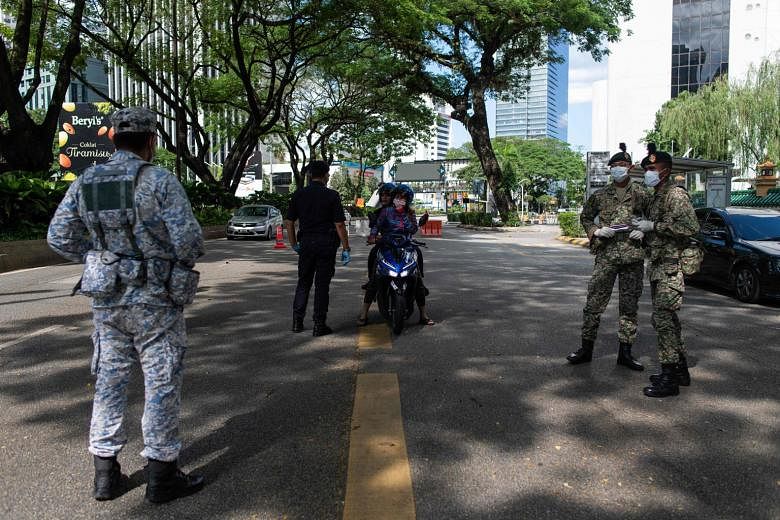Malaysia needs to flood the market with liquidity in its stimulus package today, having doubled a two-week shutdown of a parched economy that has been crippled by the coronavirus outbreak, analysts say.
Official and market estimates of over 4 per cent growth for this year have been binned, as economists are being forced to make a raft of assumptions in projecting how badly the country - also hit by a price crash that has more than halved the price of fossil fuels - will be battered by what Barclays called "a perfect storm" in its quarterly outlook.
"I am not pretending to be able to forecast with great precision in this kind of environment," one foreign bank's economist told The Straits Times, referring to the two-week movement control order (MCO) that has been in effect since March 18, and which has been extended to April 14.
Malaysia yesterday reported 235 new coronavirus cases in its biggest daily surge, with total cases at 2,031. The death tally rose to 23, with four more fatalities recorded.
Meanwhile, the government said yesterday that Malaysia's Prime Minister, the 31 Cabinet ministers and 38 deputy ministers will contribute two months of their salaries to the Covid-19 Fund, a government-backed effort to help those affected by the outbreak.
On the economy, experts say that a major uncertainty is how long the MCO will be prolonged before infections trend to zero, with some saying the end of May is more realistic.
Economists believe that each fortnight at a standstill could push Malaysia's gross domestic product (GDP) down by 1.5 to 4 percentage points.
But the consensus is that a technical recession in the first half of the year looks to be a sure thing. Whether Malaysia can bounce back in the second half appears to bank on how much cash circulates in the economy.
Previously referred to by the Muhyiddin Yassin administration as the restriction of movement order, the MCO has closed borders and non-essential commerce, and reduced human contact to bare minimum. This has effectively shrunk the income of millions - some to zero - and wreaked havoc on supply chains.
The Malaysian Institute of Economic Research (MIER) wants "an extraordinary crisis budget" to offset an estimated 12 per cent, or RM95 billion (S$31.5 billion), fall in household incomes this year.
The RM20 billion already pledged on Feb 27 by the then Mahathir Mohamad administration was largely targeted at rescuing the tourism industry and well before the MCO was put in place. But Economy Minister Mustapa Mohamed said on Wednesday that this sector alone will suffer RM20 billion in losses for the first quarter of this year.
MIER says another RM75 billion is "imperative" to head off bankruptcies and up to 2.4 million job losses, which would put about 15 per cent of the labour force out of work.
Citi Research has said that Bank Negara Malaysia's (BNM) move to apply a six-month moratorium on loan payments plus earlier measures including releasing RM40 billion of retirement savings "will provide cash flow relief for indebted households and reduce bankruptcy risk in the near term", given that the combined value is 10 per cent of GDP. But these are measures that kick the can down the road, given interest on the deferred loans will accrue during the moratorium.
One solution is to make cash cheaper in future.
Barclays' regional economist Brian Tan expects the central bank to cut interest rates by 1 percentage point, "with a growing risk of more and earlier cuts". This would mean the total reduction of 1.5 percentage points this year would rival the easing in 2008-2009 during the global financial crisis.
Expectations are that today's stimulus will inject somewhere between RM10 billion and RM20 billion.
The oil price crash has severely limited the ability of the government to spend. If the current mark of about US$25 per barrel holds instead of Budget 2020's projection of US$62, it could leave the Malaysian Treasury short of about RM10 billion in petroleum-related revenue.
But some officials in state-linked banks believe that up to RM100 billion could be channelled by leveraging other reserves, with a focus on cash handouts and developing healthcare infrastructure.


